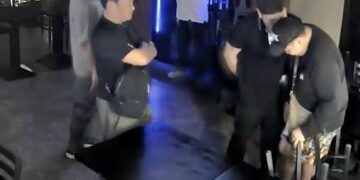From “come and get me” to “catch me if you can.”
Sen. Ronald ‘Bato’ Dela Rosa had a sudden change of heart last week when reports spread that the International Police (Interpol) was returning to the Philippines, this time to serve him a warrant for his arrest, one week after former president Rodrigo Duterte was nabbed by Interpol and flown to The Hague.
The International Criminal Court (ICC) had charged the former president with numerous murders committed when he was mayor of Davao City and later president of the Philippines.
At that time, Dela Rosa was chief of police of Davao, then promoted by Duterte to head of the Philippine National Police.
As such, he was reportedly in charge of the “tokhang” policy of Duterte which had suspected drug users and pushers killed after they were goaded to resist arrest.
This time, it is Dela Rosa who is facing arrest and he is seeking protection either by the Senate or by the Supreme Court (SC) to prevent the Interpol from nabbing him and flying him off to The Hague, where he will join Duterte in a Netherlands detention facility.
Dela Rosa said last week that he would ask Senate President Chiz Escudero to provide him a safe haven from arrest within the Senate premises, at least while Congress is in session.
But aside from seeking refuge in the Senate, he is also exploring other “courses of action” in the event the SC issues a final ruling on his petition to block the Interpol from arresting him.
Dela Rosa asked the SC to stop the government from assisting the ICC’s investigation of the Duterte regime’s war on drugs.
In the meantime, the Senator said he would remain in hiding, which was one of “the possible courses of action we can take.”
Dela Rosa had earlier insisted that he was willing to be arrested so that he can join Duterte in The Hague to take care of the 80-year-old ex-president.
Former senator Panfilo Lacson said Dela Rosa’s plan was debatable.
Himself a former PNP chief who had also gone into hiding when he was a suspect in the Dacer-Corbito case, Lacson said the legislative immunity sought by Dela Rosa under the Constitution is “limited.”
Lacson said that while it was Dela Rosa’s choice, the Senate president could grant immunity only when Congress was in session, which it is not. Also, immunity may be granted if the possible penalty faced by the applicant is less than six years.
Lacson went into hiding in 2010 over the Dacer-Corbito case which he believed to be politically motivated. Dela Rosa claims the same thing.
The biggest difference between the two is that Lacson was wanted by the PNP, while Dela Rosa is wanted by Interpol.
Lacson also said that in his case, his lawyers could plead his case before the local courts as his physical presence was not needed. Dela Rosa, however, does not have the same luxury. He will have to face the ICC just like Duterte and seek legal counsel to defend him.




























